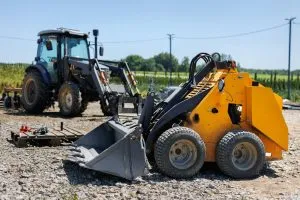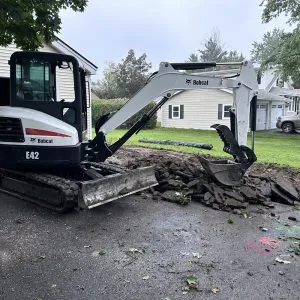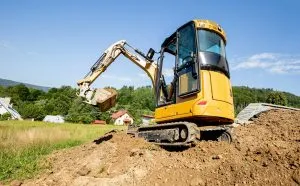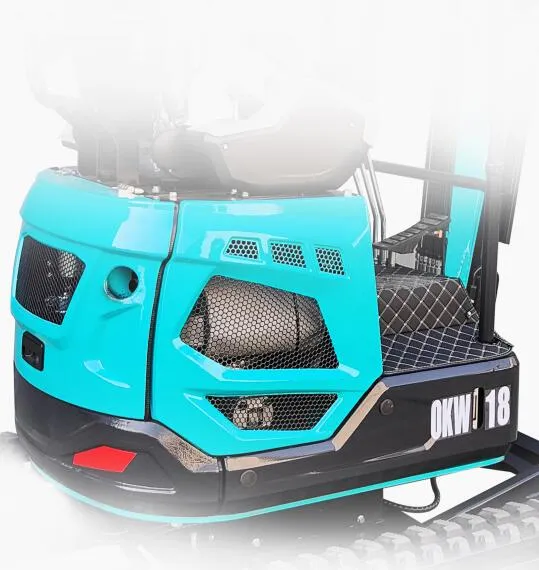Introduction to Mini Excavators
Mini excavators, also known as compact excavators, are versatile machines used in various construction, landscaping, and demolition projects. Their small size allows them to operate in confined spaces where larger machines can’t go. Despite their compact design, they offer significant power and efficiency, making them a valuable asset for both small and large-scale projects.

Benefits of Mini Excavators
Mini excavators are praised for their ease of use, maneuverability, and ability to complete tasks that larger machines would struggle with. Their lightweight design reduces the risk of site damage, making them ideal for residential areas and delicate environments.
Applications of Mini Excavators
These machines are used in diverse applications, including digging trenches, landscaping, site preparation, demolition, and utility installation. Their versatility is enhanced by various attachments, such as buckets, augers, and breakers.
Key Features of Mini Excavators
Modern mini excavators come with advanced features like improved hydraulic systems, ergonomic operator stations, and enhanced fuel efficiency. These features contribute to better performance, comfort, and cost savings.
Why Invest in a Mini Excavator?
Cost-effectiveness
Investing in a mini excavator can be more cost-effective than renting equipment for ongoing projects. Ownership eliminates rental fees and provides the convenience of having the machine readily available whenever needed.
Versatility
Mini excavators can handle multiple tasks with ease. Their ability to switch between different attachments quickly makes them suitable for various jobs, reducing the need for multiple machines.
Efficiency
These machines are designed for high productivity. They can operate continuously for long hours, ensuring that projects are completed faster and more efficiently.

Types of Mini Excavators
Compact Mini Excavators
Compact mini excavators are ideal for small-scale projects and tight spaces. They are lightweight and easy to transport, making them a favorite among contractors working on residential projects.
Standard Mini Excavators
Standard mini excavators offer a balance between size and power. They are suitable for medium-scale projects and provide better digging depth and reach than compact models.
Zero-Tail Swing Mini Excavators
Zero-tail swing models have a reduced tail swing, allowing them to operate efficiently in confined spaces without the risk of damaging surrounding structures.
Key Features to Consider
Engine Power
The engine power of a mini excavator determines its overall performance. Higher horsepower engines offer better digging capabilities and can handle more demanding tasks.
Hydraulic System
A robust hydraulic system is essential for smooth operation and efficient performance. It powers the excavator’s attachments and ensures precise control.

Attachments
The availability of various attachments increases the versatility of mini excavators. Common attachments include buckets, augers, and breakers, each designed for specific tasks.
How to Evaluate Mini Excavators for Sale
Inspection Tips
When evaluating mini excavators, inspect for signs of wear and tear, such as rust, cracks, or leaks. Check the condition of the tracks, hydraulic system, and engine.
Performance Evaluation
Test the machine’s performance by operating it. Ensure that it starts easily, runs smoothly, and all functions work correctly.
Maintenance Records
Review the maintenance records to verify regular servicing and repairs. Well-maintained machines are likely to be more reliable and have a longer lifespan.
Top Brands of Mini Excavators
Caterpillar
Caterpillar is renowned for its durable and high-performing mini excavators. Their machines are equipped with advanced technology and are known for their reliability.
Bobcat
Bobcat offers a wide range of mini excavators with innovative features. They are popular for their compact design and powerful performance.
Kubota
Kubota mini excavators are known for their exceptional quality and ease of operation. They provide excellent fuel efficiency and low emissions.
Nicosail
A Chinese small excavator manufacturer with more than a decade of production experience, its small excavators are renowned for their durability and cost-effectiveness.

New vs. Used Mini Excavators
Pros and Cons of New Mini Excavators
New mini excavators come with the latest features, warranties, and the assurance of no prior usage. However, they are more expensive than used models.
Pros and Cons of Used Mini Excavators
Used mini excavators are more affordable and can offer good value if they are in good condition. However, they may require more maintenance and have a shorter lifespan.
Cost Analysis
Consider the total cost of ownership, including purchase price, maintenance, and operational costs, when deciding between new and used mini excavators.
Where to Find Mini Excavators for Sale
Dealers
Authorized dealers offer new and used mini excavators with warranty options. They provide professional advice and after-sales support.
Online Marketplaces
Online platforms like eBay and Machinery Trader offer a wide selection of mini excavators. These marketplaces allow you to compare prices and features easily.
Auctions
Auctions can be a good source for finding deals on mini excavators. However, it’s important to inspect the machines thoroughly before bidding.
Negotiating the Best Price
Tips for Bargaining
Research market prices and be prepared to negotiate. Highlight any issues found during the inspection to leverage a better deal.
Financing Options
Explore financing options such as loans and leases. Some dealers offer financing plans that can make purchasing a mini excavator more affordable.
Trade-ins
If you have an old machine, consider trading it in to reduce the cost of your new purchase. Many dealers offer trade-in programs.
Understanding Mini Excavator Specifications
Weight
The operating weight affects the machine’s stability and transportability. Choose a weight class that matches your project needs.
Digging Depth
Digging depth determines how deep the excavator can dig. Ensure the machine can meet the depth requirements of your projects.

Reach
The reach of the excavator, including both vertical and horizontal reach, is crucial for accessing hard-to-reach areas and completing tasks efficiently.
Attachments and Accessories
Buckets
Buckets are the most common attachment, used for digging and loading materials. They come in various sizes and designs.
Augers
Augers are used for drilling holes for posts, trees, and foundations. They vary in diameter and length to suit different applications.
Grapples
Grapples are used for handling materials like logs, rocks, and debris. They enhance the machine’s versatility in demolition and forestry applications.

Financing Your Mini Excavator
Loan Options
Various loan options are available for purchasing mini excavators. Compare interest rates and terms to find the best deal.
Leasing
Leasing can be an attractive option if you want to avoid the large upfront cost. Lease agreements typically include maintenance and insurance.
Budget Planning
Plan your budget carefully, considering all costs associated with owning a mini excavator, including maintenance, fuel, and insurance.
Maintaining Your Mini Excavator
Regular Maintenance
Regular maintenance is crucial for the longevity and performance of your mini excavator. Follow the manufacturer’s maintenance schedule diligently.
Common Issues
Be aware of common issues such as hydraulic leaks, engine problems, and track wear. Addressing these issues promptly can prevent costly repairs.
DIY Tips
Some maintenance tasks can be performed by the owner, such as checking fluid levels, lubricating parts, and replacing filters. DIY maintenance can save costs and extend the machine’s lifespan.
Safety Tips for Mini Excavator Operators
Training
Ensure operators receive proper training on how to use the mini excavator safely and efficiently. Training programs are often available through manufacturers and dealers.
Protective Gear
Operators should wear appropriate protective gear, including helmets, gloves, and safety boots, to minimize the risk of injury.
Operational Guidelines
Follow the manufacturer’s operational guidelines strictly. This includes load limits, operating speeds, and safety procedures to prevent accidents.
Mini Excavator Insurance
Coverage Options
Insurance coverage for mini excavators typically includes liability, damage, and theft. Choose a policy that provides comprehensive protection.
Choosing a Provider
Select a reputable insurance provider with experience in covering construction equipment. Compare quotes and coverage options.
Claims Process
Understand the claims process and ensure you can easily file a claim if necessary. Keep detailed records of the machine’s condition and any incidents.
Environmental Considerations
Emissions Standards
Ensure your mini excavator meets current emissions standards. Newer models are designed to produce lower emissions, contributing to environmental protection.
Fuel Efficiency
Choose a fuel-efficient model to reduce operational costs and environmental impact. Fuel-efficient machines consume less diesel and emit fewer pollutants.
Eco-friendly Practices
Implement eco-friendly practices such as proper disposal of fluids, using biodegradable lubricants, and minimizing idle time to reduce environmental impact.
Common Mistakes to Avoid When Buying
Overlooking Specifications
Don’t overlook important specifications like weight, digging depth, and reach. Ensure the machine meets your project requirements.
Skipping Inspection
Never skip the inspection process when buying a mini excavator. A thorough inspection can reveal potential issues and save you from costly repairs.
Ignoring Maintenance Costs
Consider the long-term maintenance costs when purchasing a mini excavator. Budgeting for regular maintenance can prevent unexpected expenses.
Future Trends in Mini Excavators
Technological Advancements
Stay informed about technological advancements in mini excavators, such as telematics, automation, and advanced hydraulic systems.
Market Predictions
Understand market trends and predictions to make informed purchasing decisions. The demand for mini excavators is expected to grow, driven by construction and infrastructure development.
Innovation in Design
Look out for innovations in design that enhance performance, efficiency, and operator comfort. Manufacturers are constantly improving their models to meet evolving needs.
FAQs About Mini Excavators
What are the main uses of mini excavators? Mini excavators are used for digging, trenching, landscaping, demolition, and utility installation.
How do I choose the right mini excavator? Consider factors like engine power, hydraulic system, attachments, weight, digging depth, and reach.
Is it better to buy a new or used mini excavator? Both options have pros and cons. New mini excavators offer the latest features and warranties, while used ones are more affordable but may require more maintenance.
Where can I buy mini excavators? Mini excavators can be purchased from dealers, online marketplaces, and auctions.
What attachments are available for mini excavators? Common attachments include buckets, augers, grapples, breakers, and thumbs.
How do I maintain my mini excavator? Regular maintenance includes checking fluid levels, lubricating parts, replacing filters, and addressing any issues promptly.

Conclusion
Finding the perfect mini excavator involves understanding your needs, evaluating different models, and making informed decisions. Whether you choose to buy new or used, consider all factors such as cost, maintenance, and specifications to ensure you get the best machine for your projects. By following this comprehensive guide, you’ll be well-equipped to catch the best deals on mini excavators for sale.






